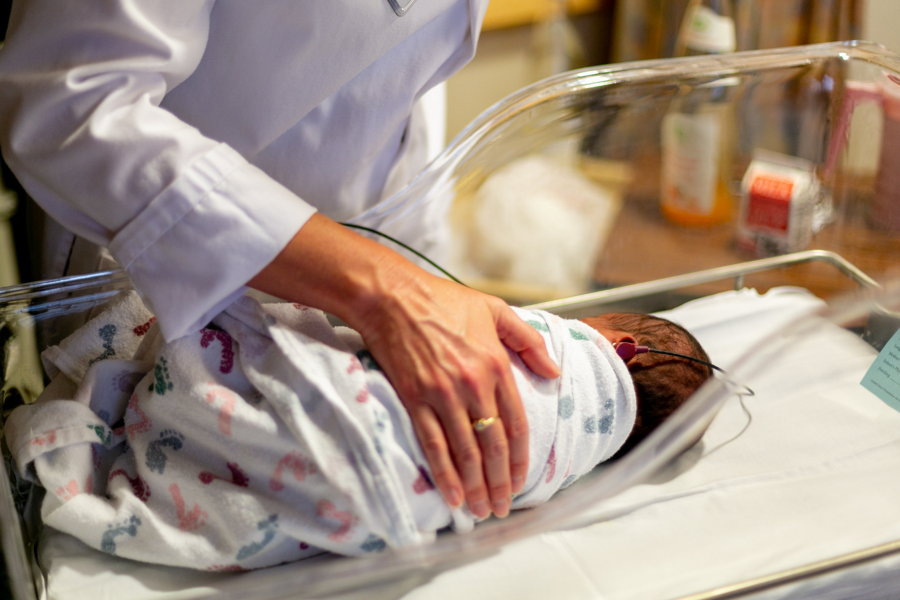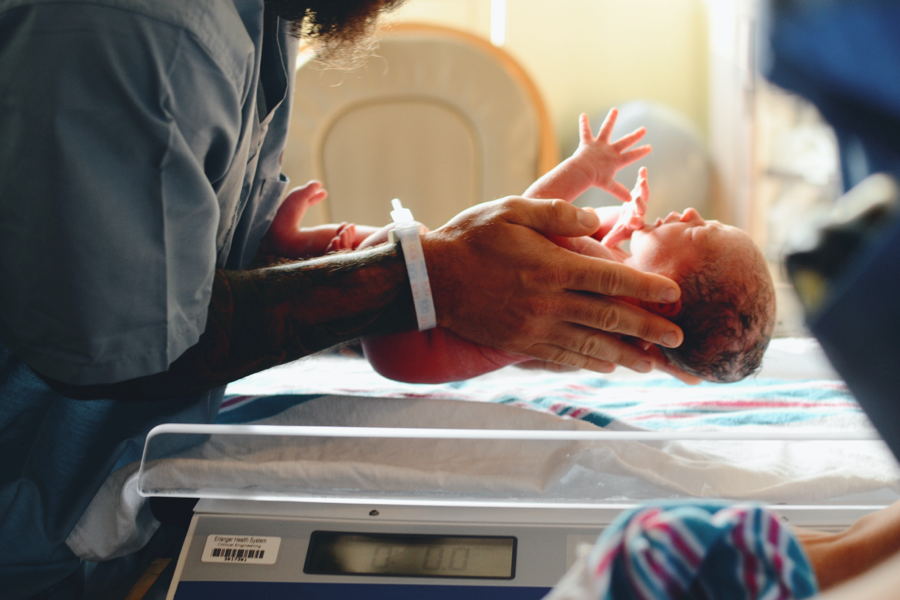
CAREER PATHS
A Day in the Life of a Neonatal Nurse
-
 EveryNurse Staff
EveryNurse Staff
- Last Updated: 05/08/2023

As a neonatal nurse, every day brings new challenges and opportunities to make a difference in the lives of our smallest and most vulnerable patients. From providing basic care to supporting infants with complex medical needs, the work we do is both rewarding and demanding. In this article, we’ll take a closer look at the role of a neonatal nurse and what a typical day on the job might involve.
The Role of a Neonatal Nurse
As a neonatal nurse, you will be responsible for providing specialized care to newborn infants who require medical attention. This can include premature babies, infants with birth defects, and those who are born with other medical conditions that require intensive care.
Education and Training Requirements
Before we delve into the specifics of our day-to-day work, let’s review the education and training required to become a neonatal nurse. To practice in this specialty, you will need to have completed a nursing program and be licensed as a registered nurse (RN). This typically involves obtaining a Bachelor of Science in Nursing (BSN) degree, although some programs may accept an Associate Degree in Nursing (ADN).
Many neonatal nurses go on to earn additional certifications, such as the Neonatal Intensive Care Nursing (RNC-NIC) certification offered by the National Certification Corporation. This credential recognizes specialized knowledge and expertise in caring for critically ill newborns and requires a combination of education, clinical experience, and exam preparation.
Key Responsibilities and Duties
As a neonatal nurse, our primary responsibility is to provide high-quality care to our patients. This may involve tasks such as monitoring vital signs, administering medications, and providing nutrition through feeding tubes or other specialized means. We also work closely with physicians and other healthcare professionals to develop and implement treatment plans and ensure that infants are receiving the best possible care for their unique needs.
In addition to these clinical duties, neonatal nurses also play a critical role in educating parents and family members about their baby’s condition and care needs. This can include teaching them how to properly care for their infant at home, as well as providing emotional support and guidance throughout the hospital stay.
The Importance of Emotional Support
Neonatal nurses play a critical role in providing emotional support to families of newborns. This can be a particularly stressful and emotional time for parents, who may be worried about their baby’s health and uncertain about what the future holds. By offering information, resources, and a listening ear, we can help ease their fears and provide guidance throughout their hospital stay.
We also work to develop individualized care plans that take the needs and concerns of the family into account, ensuring that they are an integral part of the care team.
The Beginning of a Shift
Preparing for the Day Ahead
For neonatal nurses, every shift begins with a thorough assessment of our patients and a review of any new orders or changes in treatment plans. We start by reviewing the medical records and talking with the outgoing nurse to get a sense of the current state of each baby’s health. We also check the supply inventory and ensure that all necessary equipment is clean and ready to use.
It’s crucial that we take the time to prepare for the day ahead, as we never know what challenges may arise in the neonatal intensive care unit (NICU). The health of our tiny patients can change rapidly, and we need to be ready to respond to any emergencies that may arise.
Handover and Communication with Colleagues
As care for critically ill newborns is often a team effort, we also spend time communicating with other members of the healthcare team to ensure that everyone is on the same page. This may involve attending handover meetings to receive updates on patient status and any clinical changes that have occurred since the last shift.
During these meetings, we discuss the progress of each baby, any concerns we may have, and any changes in treatment plans. We also take the time to ask questions and clarify any instructions to ensure that we’re providing the best possible care for our patients.
Assessing the Needs of Each Infant
Once we’re up to speed on the status of our patients, we begin our rounds to assess their ongoing needs. This may involve conducting physical exams, checking vital signs, and observing for any signs of distress or discomfort. We also make note of any changes in the infant’s behavior or appearance that may require further evaluation or intervention.
Assessing the needs of each infant is a critical part of our job as neonatal nurses. We need to be able to identify any potential issues before they become serious and respond quickly to any changes in our patients’ conditions. This requires a keen eye for detail and a deep understanding of neonatal health and development.
Providing Emotional Support to Families
In addition to providing medical care to our patients, we also play an important role in providing emotional support to their families. Having a baby in the NICU can be an incredibly stressful and emotional experience, and we strive to create a supportive and compassionate environment for parents and other family members.
We take the time to explain medical procedures and treatments to families, answer their questions, and provide reassurance and encouragement. We also work closely with social workers and other support staff to connect families with additional resources and services that may be helpful during this challenging time.
Collaborating with Physicians and Specialists
As neonatal nurses, we work closely with physicians and specialists to develop and implement treatment plans for our patients. This may involve consulting with neonatologists, pediatric surgeons, respiratory therapists, and other healthcare professionals to ensure that we’re providing the best possible care.
We collaborate with these experts to develop individualized care plans for each patient, taking into account their unique medical needs and developmental milestones. We also communicate regularly with these specialists to provide updates on our patients’ progress and make adjustments to treatment plans as needed.
Documenting Patient Care
Finally, we spend time documenting the care we provide to our patients. This involves keeping detailed records of vital signs, medications, treatments, and any changes in the patient’s condition. We also document any conversations we have with families or other healthcare professionals.
Accurate and thorough documentation is essential in the NICU, as it helps to ensure continuity of care and provides a record of the patient’s medical history. It also helps us to identify trends and patterns in our patients’ health and make informed decisions about their care.
Routine Care and Monitoring
Providing care for neonatal patients requires a high level of attention and expertise. At our facility, we take pride in the quality of care that we provide to our smallest and most vulnerable patients. Our team of neonatal nurses is dedicated to ensuring that each infant receives the individualized care and attention that they need to thrive.
Feeding and Nutrition
One of the most important aspects of neonatal care is ensuring that our patients are receiving adequate nutrition for their growing bodies. Depending on the circumstances, this may involve breast milk or formula provided through feeding tubes or other specialized means. We work with each family to develop a feeding plan that meets the unique needs of the infant and supports healthy growth and development.
In addition to providing nutrition, we also monitor each infant’s weight and growth to ensure that they are meeting their developmental milestones. We understand that feeding can be a stressful and emotional experience for families, and we provide support and guidance throughout the process.
Changing Diapers and Maintaining Hygiene
As with any newborn, maintaining proper hygiene is critical to preventing infection and promoting health. Neonatal nurses spend a significant amount of time changing diapers, bathing infants, and ensuring that each patient’s environment is clean and free from potential sources of infection.
We use specialized equipment and techniques to ensure that each infant’s skin is protected and cared for during diaper changes. We also work closely with families to educate them on proper hygiene practices and infection prevention measures to use at home.
Monitoring Vital Signs and Administering Medications
In addition to these routine care tasks, neonatal nurses are responsible for monitoring vital signs such as heart rate, breathing rate, and oxygen saturation levels. We use advanced monitoring equipment to track these vital signs and detect any changes or abnormalities.
If an infant requires medication or IV fluids, we administer these treatments with the utmost care and attention to detail. We closely monitor each patient for any potential side effects or adverse reactions, and adjust treatment plans as needed.
Specialized Care for High-Risk Infants
Welcoming a new baby into the world is a joyous occasion, but for families with high-risk infants, the experience can be fraught with worry and uncertainty. Fortunately, neonatal nurses are here to provide specialized care and support to these vulnerable patients and their families.
Working with Premature Babies
For premature infants, who may face a range of potential health complications, neonatal nurses provide specialized care and monitoring to ensure the best possible outcomes. This may involve administering medications or other treatments to support lung development, monitoring growth and development, and taking steps to prevent infection or other potential risks.
One of the key challenges in caring for premature infants is ensuring that they receive the nutrition they need to support healthy growth and development. Neonatal nurses work closely with feeding specialists to determine the best approach for each patient, whether that involves breast milk, formula, or a combination of the two. We also work with parents to provide education and support around feeding, so that they feel confident and empowered as they navigate this new experience.
Supporting Infants with Congenital Conditions
For infants born with congenital conditions such as heart defects, neonatal nurses work closely with medical teams to develop treatment plans and ensure that patients receive the care they need to manage their conditions effectively. This may involve specialized monitoring, medications, or other interventions to support healthy heart function and overall well-being.
At the same time, we recognize that caring for a baby with a congenital condition can be emotionally challenging for parents and families. That’s why we place a strong emphasis on communication and collaboration, working closely with families to provide education and support and ensure that they feel empowered and informed as they navigate this new chapter in their lives.
Collaborating with Multidisciplinary Teams
Throughout it all, neonatal nurses work closely with other members of the healthcare team, including physicians, respiratory therapists, neonatal nurse practitioners, and occupational therapists, to provide coordinated and comprehensive care to our patients. Through collaboration and communication, we can ensure that each infant receives the best possible care and support during this critical period of development.
Ultimately, our goal as neonatal nurses is to provide compassionate, evidence-based care that supports the health and well-being of our patients and their families. We feel privileged to be a part of this journey, and we are committed to doing everything we can to ensure that every baby receives the best possible start in life.















